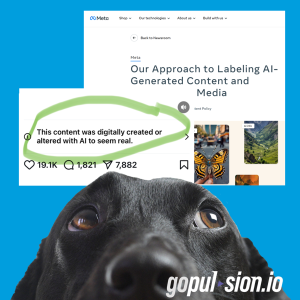 Two more emails. The first starts with, “We manage our social media in-house, and now messages indicating that our content is AI-generated are popping up all over our past posts—What can we do?” The second shares that they have no in-house creative resources, but they used a free AI tool to generate imagery, and now a company is claiming copyright infringement. Can they use AI-generated imagery? Isn’t it unique?
Two more emails. The first starts with, “We manage our social media in-house, and now messages indicating that our content is AI-generated are popping up all over our past posts—What can we do?” The second shares that they have no in-house creative resources, but they used a free AI tool to generate imagery, and now a company is claiming copyright infringement. Can they use AI-generated imagery? Isn’t it unique?
The fast answer is that if you represent a growing brand, be highly strategic about using AI-generated content on your brand’s search or social media. For example, consider using AI to generate post text and meta descriptions but not for SEO-optimized blogs, videos, or images intended for social media. Look at where AI fits in your organization—where it helps and where it could be problematic.
Also, make sure you know what AI your team is using. What are the usage and data terms? What happens with the data your company puts in? Where is the data that comes out coming from? Does it provide a source? Is it free of copyright infringement?
Here are two examples:
- Your communications person uses an Open AI tool to proof your strategy for next year. Would you want that data produced all or in part based on a prompt request in an AI tool?
- Your team generates a blog, and the AI states the sources but doesn’t directly link to where the source said what was included in your blog – that content may not be factual. If the source disagreed with what you said, there could be fallout if someone took action based on faulty advice because the AI made it sound great, so your team included it in the content, but it wasn’t accurate to begin with.
The issue is that AI has created the capability to generate content quickly—good quality content that is “usable.” However, where search and social media are concerned, this can lead to an overall degradation in the quality of the content and user experience, from accuracy to plagiarism to fraud. This has forced Meta, Google, LinkedIn, and other prominent social media players to look for ways to ensure that the public can be made aware that something was generated using AI.
As one example, META has introduced tags that appear under posts that are AI-generated, indicating that content is or may have been AI-generated. In the instance of video, we have seen it say that the content “may not be real.” There are varying tags depending on what the algorithm has determined. This is the most recent running update Meta offers on the topic. https://about.fb.com/news/2024/04/metas-approach-to-labeling-ai-generated-content-and-manipulated-media
What does that mean to you? If you are a brand mid-market or larger, it means an erosion of trust in your brand and credibility. Dare I say it tells your customers that your team is just looking for the fastest, easiest way to churn out content instead of crafting content intended to be of actual value to audiences, genuine, validated, and accurate? Add to that, the social and search giants will continue to refine their algorithms to ensure the best overall user experiences, meaning, if you make AI-generated content part of the bones of your content strategy – you will need to be prepared for all potential outcomes.
AI is fantastic and can make your marketing teams powerful, much faster, and more agile. However, at the leadership level, the organization must determine its guidelines and policies surrounding the use of AI in marketing and communication. What will be the do’s and don’ts? Where can AI make us faster and better, and where does it make sense for humans to drive the content, at least until more is known about how the social media giants will treat AI-generated content in the future. If you would like to collaborate about where AI fits in your sales and marketing infrastructure, please reach out to us or visit www.gopulsion.io.